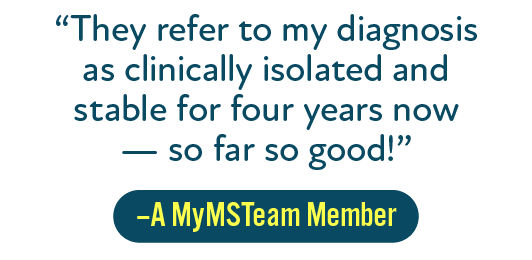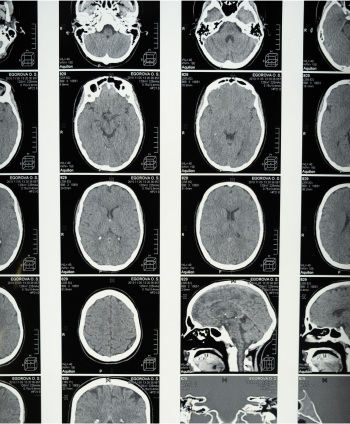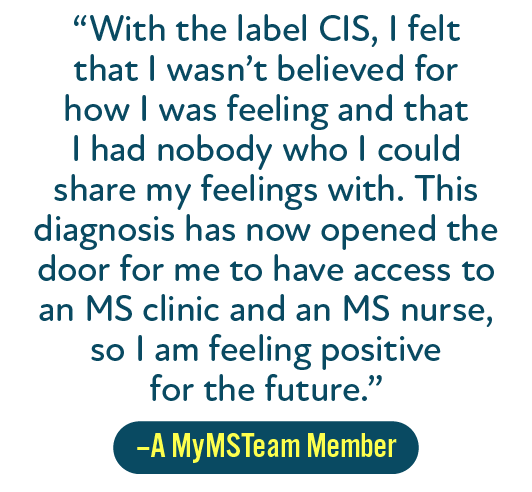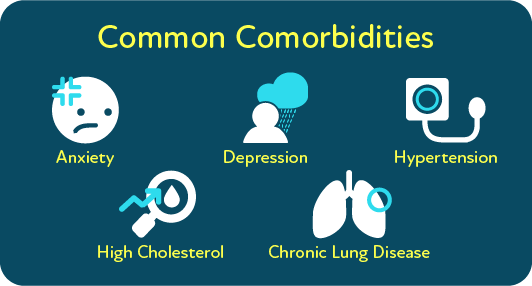
Powered By





 Continue with Facebook
Continue with your email
Continue with Facebook
Continue with your email
When someone experiences neurological symptoms for the first time, which last 24 hours or longer and cannot be explained by fever or infection, a doctor may diagnose clinically isolated syndrome. Some diagnoses of CIS include brain lesions which are visible on a magnetic resonance imaging (MRI) scan.
CIS can sometimes progress to multiple sclerosis. In other cases, a person might experience a single episode of CIS and recover, either completely or partially, and have no further episodes. It can be difficult not to know whether these symptoms will happen again and what the future holds, such as a potential MS diagnosis.
 As one MyMSTeam member said, "They refer to my diagnosis as clinically isolated and stable for four years now — so far so good!"
As one MyMSTeam member said, "They refer to my diagnosis as clinically isolated and stable for four years now — so far so good!"
Keeping a journal of your experiences, staying educated about CIS, talking with others who've experienced it, and making your overall physical and mental health a priority are all steps that may mitigate the stress of living with uncertainty.
CIS symptoms vary among individuals, but they affect the central nervous system. They might include eye pain and poor vision, muscle weakness and tingling feet, dizziness, vertigo, and sensations that feel like electric shocks. When just one of these symptoms occurs, it's known as a monofocal episode; having them simultaneously is called a multifocal episode.
 If someone experiences a second bout of neurological symptoms or lesions on the brain get worse, a diagnosis of CIS is usually changed to MS. Some studies have shown that the number of lesions present, as well as their size and location, can help predict the risk of a future MS diagnosis. If an MRI scan during CIS shows lesions that resemble MS, there is a 60 percent to 80 percent likelihood of a future MS diagnosis in several years. If there are no lesions, the chance of being diagnosed with MS in the same time period drops to 20 percent.
If someone experiences a second bout of neurological symptoms or lesions on the brain get worse, a diagnosis of CIS is usually changed to MS. Some studies have shown that the number of lesions present, as well as their size and location, can help predict the risk of a future MS diagnosis. If an MRI scan during CIS shows lesions that resemble MS, there is a 60 percent to 80 percent likelihood of a future MS diagnosis in several years. If there are no lesions, the chance of being diagnosed with MS in the same time period drops to 20 percent.
No amount of medical testing can prepare you for the uncertainty of whether an MS diagnosis is in your future. As one MyMSTeam member with a recent CIS diagnosis shared, "Some days I wonder, is it really MS or in my head?"
Another member spoke about the limbo they experienced while waiting to see what would happen. Even though they eventually received an MS diagnosis, they expressed feelings of hope: "With the label CIS, I felt that I wasn’t believed for how I was feeling and that I had nobody who I could share my feelings with. This diagnosis has now opened the door for me to have access to an MS clinic and an MS nurse, so I am feeling positive for the future."
 The data is clear that early treatment of CIS, especially in those who have MRI results showing brain lesions consistent with MS, can reduce the disease activity that may lead to long-term disability. Some medications can help reduce the inflammation that is closely linked to demyelination, which refers to the damage caused to nerve cells' protective layer (called myelin). It is this damage that leads to neurological issues.
The data is clear that early treatment of CIS, especially in those who have MRI results showing brain lesions consistent with MS, can reduce the disease activity that may lead to long-term disability. Some medications can help reduce the inflammation that is closely linked to demyelination, which refers to the damage caused to nerve cells' protective layer (called myelin). It is this damage that leads to neurological issues.
Other benefits of early treatment include prolonging the period between the CIS and MS diagnoses and combatting the effects of cognitive impairment and depression. Doing so may help people stay involved with fulfilling activities that improve their quality of life, such as spending time with loved ones, continuing to work, and staying physically active. In some cases, drug therapies may even prevent a subsequent neurological event from happening.
Lifestyle changes, like quitting smoking, can also support your health.
If your CIS symptoms are mild, they may resolve without intervention. But if you've experienced issues such vertigo or vision loss and eye pain (called optic neuritis), your doctor may prescribe a short course of high-dose steroids, taken either orally or intravenously.
If an MRI scan shows that you're at a higher risk for developing MS, you may be offered a disease-modifying therapy to help prevent or delay another neurological event. Learn more about treatments for CIS.
If you've been diagnosed with CIS, one of the most important things you can do for your health is to quit smoking. Smoking is a risk factor for MS, and those with CIS who smoke are more likely to later receive an MS diagnosis. If diagnosed with MS, smokers are also more likely to experience brain atrophy and frequent relapses.
There may be a link between MS and low levels of vitamin D. People usually get vitamin D through sun exposure, which encourages your body to produce it. Vitamin D is also found in foods such as fatty fish (like salmon), egg yolks, and mushrooms. If your blood work has shown low vitamin D levels, you may want to discuss supplementation with your doctor.
MS experts recommend following a healthy diet, like the high-fiber, low-fat meal plan recommended by the American Heart Association. This will help keep energy levels high and your bladder and digestive system running smoothly, all of which is important to your overall general health.
It's important to let your doctor know right away if you experience a second bout of symptoms after a CIS diagnosis, since they will likely want to schedule a follow-up MRI. Even if your symptoms don't recur, many physicians recommend returning for a follow-up MRI within 12 months.
If you have started a disease-modifying therapy given by infusion, you'll need to schedule appointments at the required time period (such as every four weeks or every three months). If you're on any type of medication, your neurologist will likely want to see you at regular intervals for checkups. They may want to perform tests, such as blood work, to make sure the medication is not causing any adverse effects.
 As one MyMSTeam member suggested, "Keep a journal of everything that takes place in chronological order and present to your doctor as necessary." Writing a log of your symptoms will help you share the most comprehensive picture of your health with your neurologist at each appointment. It will also help you easily answer questions about how long you’ve had certain symptoms.
As one MyMSTeam member suggested, "Keep a journal of everything that takes place in chronological order and present to your doctor as necessary." Writing a log of your symptoms will help you share the most comprehensive picture of your health with your neurologist at each appointment. It will also help you easily answer questions about how long you’ve had certain symptoms.
The more you track, the more you'll start to learn about what might trigger your symptoms, or how things like food choices and activity levels affect how you feel. If you've started any medications, this is a good place to note any side effects. You can use a special notebook just for this purpose, download and print a symptom tracker worksheet, or use a mobile phone app such as the Multiple Sclerosis Association of America's My MS Manager app.
Uncomfortable uncertainty can follow a CIS diagnosis. But arming yourself with sound, evidence-based information can make you feel more in control over your health care journey. You can learn more about CIS and MS from organizations such as the National Multiple Sclerosis Society, the Multiple Sclerosis Trust, and the National Institute of Neurological Disorders and Stroke.
The term "comorbidity" refers to one person having two or more separate health conditions. Researchers have found a high occurrence of comorbidity in those with MS, with the most common conditions being:

Having a comorbid condition has been linked to worse health outcomes for people with MS. These might include a longer time between the start of symptoms and receiving a diagnosis, or a greater progression of disability. One of the best ways to reduce concerns about these chronic conditions is to avoid developing one in the first place. In the case of high cholesterol or heart disease, following a balanced diet, exercising, and avoiding smoking can all help reduce risk.
Looking for support and a place to share your MS and CIS questions, concerns, and victories? At MyMSTeam, a support group and social network for people with MS, you'll be welcomed into a community with more than 164,000 members. Some have faced MS and its challenges for years, while others have just received their initial CIS diagnosis. Members trade tips for managing difficult symptoms, share their discoveries about new medications and research, and help each other maintain a positive attitude.
Have you received a CIS diagnosis? Do you have suggestions for others who might be in the same situation? Share your tips in a comment below or on MyMSTeam.
Get updates directly to your inbox.



 Continue with Facebook
Continue with your email
Continue with Facebook
Continue with your email
Become a member to get even more




A MyMSTeam Member
Thank u Golgotha.
We'd love to hear from you! Please share your name and email to post and read comments.
You'll also get the latest articles directly to your inbox.